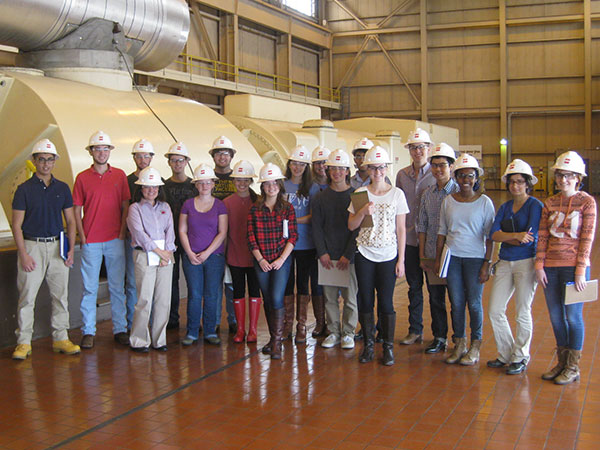
Eighteen honors engineering sophomores got to view thermodynamics in action thanks to a recent site visit to the Flint Creek Power Plant outside of Gentry. Heather Walker, a clinical assistant professor of chemical engineering, set up the field trip to the plant, which provides power for all of Northwest Arkansas.
Engineers use thermodynamics to calculate the energy expenditure required to conduct various processes, such as converting steam heat to energy or refining crude oil to create gasoline and diesel fuels.
“Thermodynamics is one of those foundation courses that all engineering students must take,” Walker said. “It can be very theoretical, complicated and deep; I really wanted to bring some kind of real-world experience to the students, because the information that we cover is extremely useful, and they’ll use it a lot.”
Because all power plants are considered national security sites, post-Sept. 11, the students were required to go through background security checks and were escorted by a plant employee the entire time they were on site. Visiting groups are limited to twenty, so Walker elected to offer the experience to the honors section of her course. The experience was well worth the red tape.
“Though we have discussed countless examples of mass and energy balances in class, it wasn't until we visited the plant that I was able to really visualize the principles we have learned. ... It was extremely interesting and eye-opening to see how the mass and energy balances are used there on a daily basis to solve real-life problems," honors chemical engineering student Emily Degner wrote in a follow up report.
“Just to have the students see how much coal they bring in daily – 72 train cars, brought from Wyoming, to power Northwest Arkansas for a day – that was valuable,” Walker said. “Now when they flip a light on, they’ll know exactly where the energy comes from, and how they’re using thermo to create that energy.”
For most of the students, it was their first time to visit a plant. Walker says the trip showed the students how engineers function as the “mind of the operation,” making good decisions quickly when issues come up.
“It really reinforced to the students that this is not a course to get through, then sell your textbook,” Walker said. “The operators and engineers are using thermodynamics on a daily basis, 20 years after graduation. Embrace it, and learn it well.”
Contacts
Kendall Curlee, director of communications
Honors College
479-575-2024,